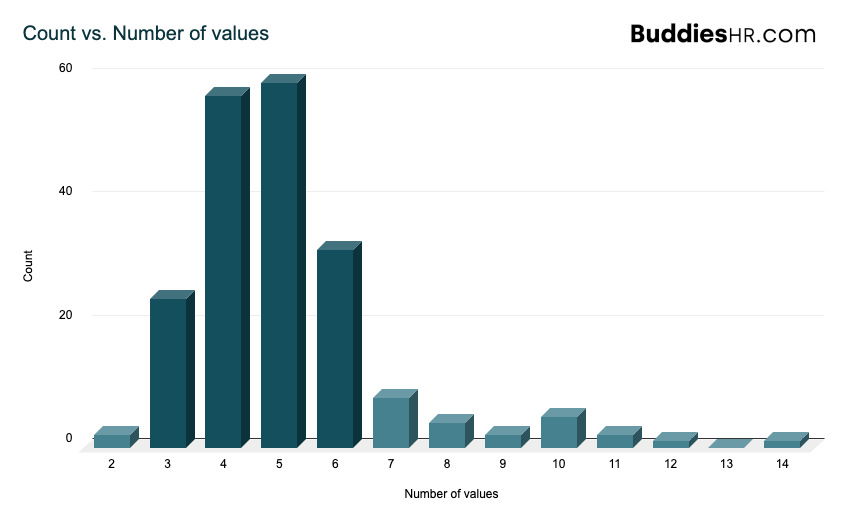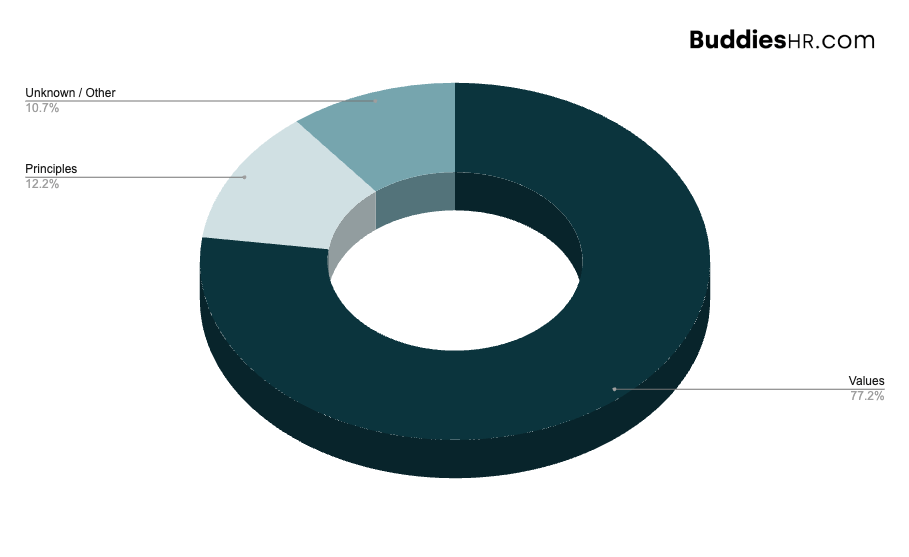Startup Culture Insights Report [2024 edition]
Key takeaways
- 35% of companies don’t share their company values publicly
- The standard number of values typically falls between 3 and 6
- Top 5 company values are Customer centric - 41%, Ownership - 32%, Bias for action - 25%, Growth mindset - 19%, Team cohesion - 15%
- Top 5 value categories are:
- Customer centric - 41% (Customer centric)
- Bias for action - 40% (Bias for action, Focus, Impactful, Iteration, Urgency)
- Integrity & Trust - 37% (Disagree and commit, Humility, Integrity, Low ego, Trust)
- Growth mindset - 37% (Continuous learning, Curiosity, Dive deep, Growth mindset, Problem first, Truth-seeking)
- Ownership - 32% (Ownership)
- Values versus principles - values as fundamental pillars of your culture, principles describe how they translate in everyday operations.
- You should order the values by importance except if you can find a good acronym.
How We Got the Data for This Report and our methodology
Our study is built upon data collected from startups that have passed through the prestigious startup incubator known as Y Combinator (YC). We started by taking the list of all “Top Private” and “Public” companies, totalling 305 companies. According to YC, "Top Private" companies are those that have achieved a valuation exceeding $150 million in their most recent funding round.
Afterward, we searched for the values of these companies online and found them for 197 of them, which makes up 65% of the total. It's interesting to note that 35% of these companies (which is more than a third) don't share their values publicly. (yet?)
1. How Many Values Should You Have?
When you're in the process of (re)designing your company values, you might find yourself asking: "Is having X number of values a good choice? Is it too many or too few?" Don't worry; we've got the answers for you!

As you can see from this graph, the standard number of values typically falls between 3 and 6. What's not mentioned in the graph is that many companies with 7 or more values are actually dealing with principles (but we'll discuss this in more detail later).
2. Top 15 Company Values
Here we go, the moment you've been waiting for: what are the most popular company values right now?
- Customer centric - 41%
- Ownership - 32%
- Bias for action - 25%
- Growth mindset - 19%
- Team cohesion - 15%
- Excellence - 15%
- Integrity - 13%
- Humility - 12%
- Empathy - 12%
- Innovation - 10%
- Trust - 9%
- Care - 9%
- Honesty - 9%
- Ambition - 8%
- Collaboration - 8%
Nothing too surprising, but it's worth noting that a whopping 59% of companies are not focusing on being customer-centric. (Just kidding... 🤪)
3. Top Categories for Company Values
As you might have noticed in the previous ranking, some company values can be grouped into categories, and we've done that work for you!
Here is the list of the 22 main categories of company values and the values they include:
- Customer centric - 41% ( Customer centric )
- Bias for action - 40% ( Bias for action ,Focus, Impactful, Iteration, Urgency)
- Integrity & Trust - 37% ( Disagree and commit , Humility, Integrity, Low Ego, Trust)
- Growth mindset - 37% ( Continuous learning , Curiosity, Dive deep, Growth mindset , Problem first , Truth-seeking )
- Ownership - 32% (Ownership )
- Care & Empathy - 31% (Care, Compassion, Empathy, Humanity, Kindness, People first, Work-life balance )
- Honesty - 22% (Candor, Honesty, Respect, Transparency)
- Excellence - 22% ( Above and beyond , Excellence, Quality, Raise the bar )
- Team bonding - 22% ( Help others succeed , Team cohesion , Fun)
- Collaboration - 19% ( Collaboration , Constructive feedback , Team first, Team player, Teamwork)
- Diversity - 18% ( Authenticity, Diversity, Inclusivity, Openness)
- Efficiency - 15% ( Efficiency, Frugality, Simplicity, Consistency)
- Innovation - 15% ( Creativity, Innovation, Problem solver )
- Ambition - 14% (Ambition, Think big)
- Grit - 14% (Grit, Hungry, Relentlessness , Resilience, Tenacity)
- Courage - 14% (Boldness, Confidence, Courage, Risk taking)
- Purpose - 12% ( Mission driven , Passion, Purpose)
- Speed - 7% (Speed, Velocity)
- Accountability - 6% ( Accountability , Responsibility )
- Rigor - 6% ( Data-driven, Discipline, Rigor, Thoughtfulness )
- Think long term - 6% (Pragmatic, Think long term )
- Performance - 5% ( Performance, Results Oriented )
These categories provide a clear picture, with six categories standout from the others as they are used by more than 30% of companies. If you're currently (re)designing your company values, these categories are definitely worth considering!
4. Values vs. Principles
We've recently observed a growing trend in companies referring to their values as "principles." Many of them argue that values alone may not be actionable enough. They may have a point, especially when values are not clearly explained in terms of how they manifest in day-to-day operations. In our view, values should not be open to interpretation.
Ideally, a combination of both should be used: values as fundamental pillars of your culture, and principles within each of them to provide employees with a clear understanding of how they translate into the company's daily activities. Now, let's take a look at the data:

Principles currently represent 12.2% of companies, which is not a significant portion. We will continue to monitor this KPI in future reports to gauge the evolution of this trend!
5. The Order of Values
Have you ever wondered if the order of values matters? Well, it depends!
If you can construct an acronym using your values, then by all means, go for it. It makes it much easier for all your employees to remember your values! Examples of this approach can be seen with CREDIT at Gitlab, EPIC at Nomba, and CREAMY at Eclipse Foods.
However, if creating an acronym isn't feasible, then arranging them from the most important to the least important may be your best choice.
For instance, in our previous company (PaletteHQ S21), we found it logical and important to place Integrity as the first value. This decision was driven by the fact that we were dealing with critical customer data (CRM, Invoicing). We paid particular attention to this value during our hiring processes and daily operations.
Final Thoughts
We sincerely hope you found this report informative and valuable. If you feel that anything is missing, could be improved, or if there's something you wish was included, please don't hesitate to reach out to us at hello@buddieshr.com 💌. Your feedback is greatly appreciated!

